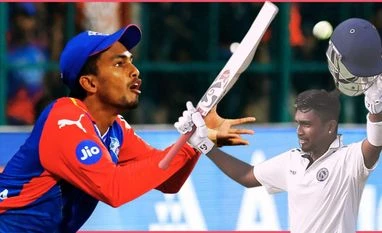In a standout performance at the Arun Jaitley Stadium, Jharkhand's young wicketkeeper-batter Kumar Kushagra showcased his batting prowess, hitting a masterful 156 off 188 balls against Delhi in the Ranji Trophy. The 20-year-old’s impressive innings, featuring 17 fours and 5 sixes with a strike rate of 82.89, comes at a crucial time—just ahead of the 2025 Indian Premier League (IPL) mega auction.
Kushagra, who triggered a bidding war between Delhi Capitals and Gujarat Titans during the 2024 IPL mini-auction, ultimately went to Delhi for Rs 7.20 crore after Gujarat raised the stakes to Rs 7 crore. With scouts from Gujarat present at the stadium, his powerful knock will surely have reignited interest and raised expectations of another intense auction for the promising talent. The
IPL 2025 mega auction is scheduled to take place in Saudi Arabia's Jeddah on November 24 and November 25.
Here’s what Kushagra said after his classy century at the Arun Jaitley Stadium. Edited excerpts:
What was your approach to batting on a pitch that initially favoured fast bowlers?
Initially, when we started the match, the wicket seemed a bit helpful for the fast bowlers. We decided to delay playing aggressive shots to benefit the team. However, as the game progressed, I realised that playing shots on this wicket was possible. So, I took the opportunity to play my shots. One thing that remained on my mind was the need to keep the team’s score ticking. I felt it was important to take the initiative and contribute to the scoreboard.
How do you handle the pressure of wicketkeeping competition in Jharkhand, and how do you stay focused on your game?
I don’t see it as a competition because my focus is on doing my job. My thoughts revolve around what I need to do and how I can score runs. I also keep in mind which format is currently important and adjust my focus accordingly. My priority is my game, and I try not to think much about what others are doing. If I perform well, everything else will fall into place.
After the Duleep Trophy, I faced some challenges due to the intense heat in Kerala, which caused stiffness in my back and significant discomfort. Unfortunately, this led to me missing an India A tour to Oman. I’ve been reminding myself to give my best whenever and wherever I get an opportunity.
How has interacting with legends like Ganguly, Laxman, and Pant shaped your approach to the game?
It is a great privilege to have such exceptional coaches, and we get a chance to learn so much from them. You don’t get to interact with such legendary figures everywhere, so whenever I meet them, I try to absorb as much as possible. I focus on understanding the shots they played in their time, which could be adapted to today’s game, and learn how to improve my approach. I ask questions about which shots to play in specific situations.
I make it a point that if I am part of a 30-day camp, whether for India A or even in the Indian Premier League (IPL), I should return having learned something new every single day. These lessons help me when I return to domestic cricket or prepare for different tournaments. By interacting with them, my understanding of the game continues to grow.
How do you balance playing your natural shots while adapting to challenging match situations?
No, my shot selection is not about making an impression; these are my natural shots, and that's why I play them. Playing my shots helps me stay confident and true to my game.
Thanks to my father, my basics are strong, which allows me to continually improve my game. However, there’s only so much you can refine technically. Beyond that, what really matters is your mindset, your character, and how you handle challenging situations to help your team.
You learn these aspects when you play at higher levels like India A, the Duleep Trophy, or similar competitions. These experiences teach you how to adapt and excel in critical moments.
How do you manage expectations and ensure thorough preparation for different formats and conditions?
There is no pressure, but there is always an expectation from yourself. However, I believe that preparing well for the format we are playing is far more important. Execution is not always in our control—it sometimes works out, and sometimes it doesn’t.
What matters more to me is whether I’ve prepared properly for the conditions I’m playing in. For instance, if I’m playing on a red-soil pitch, the key question is whether I’ve practised for it adequately. If the execution doesn’t happen during the game, that moment becomes the past, but the focus must always be on preparation.
How do you plan to adapt quickly to new conditions, and what role have the inputs from mentors like Rishabh Pant, Ricky Ponting, and Sourav Ganguly played in your preparation?
This is the first time for me, but I feel that with five to six days of preparation, I can adapt. It means that the shots I am playing are just an extension of my natural game, and I will build on that.
Yes, I have received very valuable inputs from Rishabh Bhaiya—he has shared a lot of insights with me. I’ve also learned a great deal from Ricky Ponting, Saurabh sir, and many others. These experiences have been incredibly enriching for my growth as a player.
)